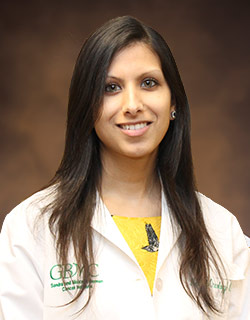When integrative and traditional medicines combine, patients win
February 21, 2022
Treatments like chemotherapy and radiation are established, clinical methods for treating cancer. While they are effective at treating the disease itself, providing integrative and palliative medicine alongside these conventional treatments ensures the patient’s physical and emotional wellbeing are also being addressed.
“Integrative means using all the different tools while palliative means reducing the physical and emotional suffering,” Delia Chiaramonte, MD, a palliative medicine physician and Medical Director of Integrative Medicine at GBMC, explains.
Kruti Patel, MD, a radiation oncologist in the Sandra and Malcolm Berman Cancer Institute at GBMC, says the collaboration between radiation oncology and the integrative and palliative medicine team immensely benefits patients going through treatment.
“Radiation can be claustrophobia-inducing, especially if the cancer involves the brain or head and neck region,” Dr. Patel explains. “Patients often have to wear a mask for the duration of their treatment - sometimes up to an hour – under a large machine, in a room by themselves. It can be very stressful.”
Dr. Patel says utilizing techniques introduced by the integrative medicine team, like guided imagery, can help tone down the anxiety the patient feels during treatment.
Integrative medicine can be used throughout a patient’s treatment and recovery, helping them cope with side effects from radiation like:
- Fatigue. Dr. Patel explains, “We can break down the causes of the fatigue and find ways to tackle them. Yoga, dance, and qigong can all help with strength and stamina.”
- Poor sleep. Mindfulness practices before bed and melatonin are potential options offered by the integrative and palliative team to help patients increase their quality of sleep.
- Pain. Massage, guided imagery, and meditation, along with helping the patient understand how the brain perceives pain, are tools the patient can utilize to manage their pain, Dr. Patel says.
There’s also an emphasis on mental health in integrative and palliative care, which can play a role in how a patient responds to treatment.
“Exploring patients’ thoughts and emotions in an effort to understand how they are processing the diagnosis, therapies and side effects can improve the treatment experience, both the physical and emotional aspects,” Dr. Patel says.
Dr. Chiaramonte says the partnership with the Radiation Oncology team at GBMC is unparalleled. Radiation can help eliminate cancer, but it can cause side effects. It’s important to balance those with integrative medicine treatment approaches, which can teach patients how to manage the side effects of radiation.
“We truly are part of the team. More and more physicians are recognizing the benefits of this integrated approach and how it helps the patient,” Chiaramonte says. “They care about the whole person and want to treat the whole person.”
Dr. Patel agrees, “integrative medicine is strongly valued at GBMC, and we are actively growing the program because it’s an important part of the patient experience.”




